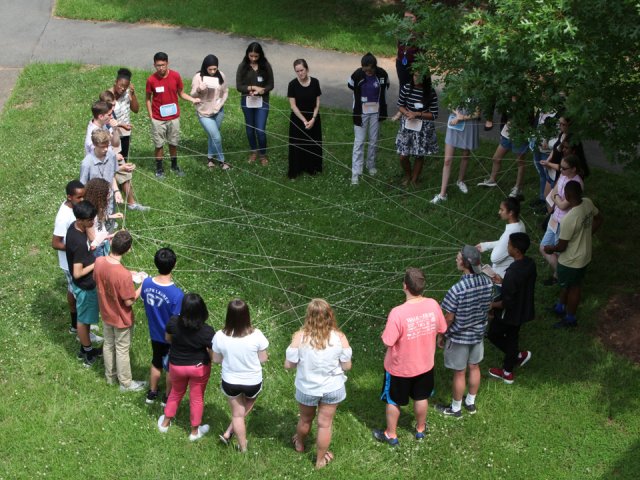STEM Outreach Provides Opportunities for Students and Teachers
Published February 20, 2020
Many scientists credit a teacher with helping inspire them to pursue a career in science, technology, engineering, and mathematics (STEM). A hands-on demonstration or experiment with a connection to real-world challenges can make textbook studies come alive with renewed importance and possibility for students, plus illuminate career paths not previously considered. As EPA celebrates its 50th anniversary in 2020, our agency will be highlighting scientific contributions to public health and environmental protection. Part of this celebration will include our scientists and engineers sharing their scientific knowledge and how EPA science has contributed over the past 50 years to better understand and tackle environmental issues.
EPA researchers are involved in a variety of STEM outreach activities with schools and students of all ages. They share their knowledge at workshops designed for students and visit classrooms, museums, educational fairs, and other venues to connect the public with environmental stewardship and opportunities in environmental science. Some researchers have even created innovative environmental education activities hoping to inspire the next generation of environmental professionals.
International Outreach
EPA’s STEM resources also further international science diplomacy through programs such as the U.S. State Department’s Embassy Science Fellowship (ESF) Program. The program offers U.S. Embassies an opportunity to host a scientist for a short period of time, who will provide expertise and assistance with science and technology-related issues. Several EPA staff who have participated in the program have taken with them EPA-developed hands-on environmental education and STEM resources.
Recent ESFs include:
- Kelly Witter, EPA’s Research Triangle Park, North Carolina, STEM Outreach Program Manager, as an Embassy Science Fellow at the U.S. Embassy in Bosnia and Herzegovina taught 650 students and educators how to improve air quality and protect health at 11 schools.
- EPA Scientist Dr. Rachelle Duvall was stationed at the U.S. Embassy in Canberra, Australia, where she shared her expertise on air quality and climate change, while also engaging in STEM education and encouraging students to consider careers in STEM fields. Dr. Duvall also extended this STEM education support to the U.S. Embassy in New Zealand working with a local university and indigenous students.
- EPA Scientist Beth Hassett-Sipple collaborated with the U.S. Embassy in Bosnia and Herzegovina to design and champion programs to improve awareness of the health impacts of air pollutants, specifically particulate matter. She developed innovative strategies for communication of scientific information to key stakeholders, including medical health professionals, policymakers, and the general public.
- Dr. Lester Facey, EPA’s National Program Manager for Minority Academic Institutions, worked with Togo’s Ministry of Education to develop their STEM initiatives. He evaluated STEM education in schools, and teacher colleges throughout the county.
Outreach at Home

Several of the unique STEM resources and activities developed by our staff are now being used in outreach in U.S. schools. The educational resources include:
- Generate: The Game of Energy Choices: This educational board game is a fun way for students and others to explore what energy choices mean for our air, water, and future environmental quality. With no “right answers” the game allows students to develop evidence-based decision-making as they advocate to team members their preferences for the energy mix and calculate and compare costs of their solutions. Materials to make the game board and game pieces, along with middle and high school teaching guides are available free online.
- Build Your Own Particle Sensor Kits: This hands-on learning activity teaches the basics of particulate matter air pollution, air quality, and electronics while building problem solving and other STEM skills. Targeted for Grades 5–12, students can build their own particulate matter sensor. The instructions include a materials list, an instruction guide with background information on air quality and the Arduino code for the sensors.
- EnviroAtlas: This web-based tool combines maps, analysis tools, and interpretive information on ecosystem goods and services to support sustainable and healthy communities. A suite of free K-15 EnviroAtlas Educational lesson plans and resources were developed that leverage the mapping tool and adhere to State Science Educational Standards. Six mini-lessons for Grades 4–6 have been added to introduce the concept of ecosystem services in a blended learning format.
STEM Student Design Competition
EPA’s People, Prosperity, and the Planet (P3) Program, a successful STEM education program, is a national design competition that provides teams of college and university students with grants to turn their creative ideas for environmental solutions into a reality. The student design competition highlights the use of scientific principles in creating innovative projects focused on sustainability, providing a practical application of STEM to environmental issues. The two-phased program provides students with an initial grant of up to $25,000 to test, research, and develop innovative scientific projects or engineering designs to promote sustainable development. P3 student teams then showcase their designs at the EPA’s P3 Expo and compete for an additional grant of up to $100,000 to further develop and demonstrate their sustainability projects and designs.
Editor's note: A version of this story was originally published in EM Magazine.
